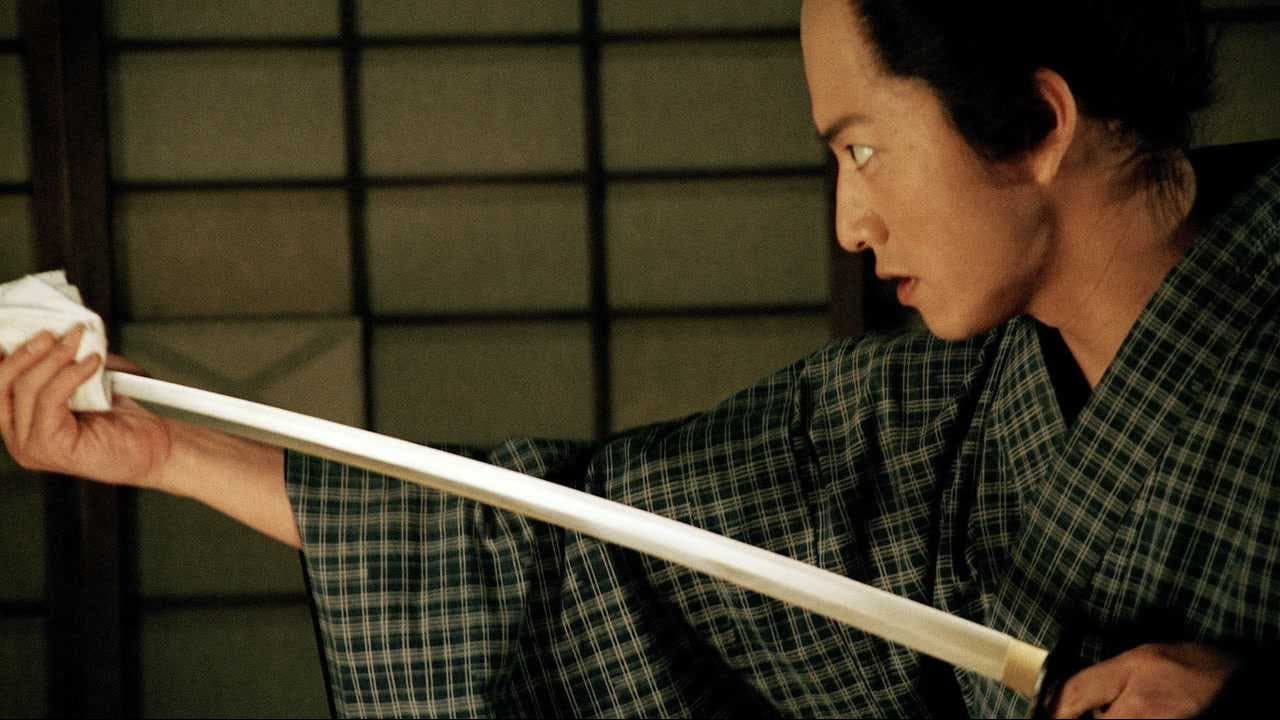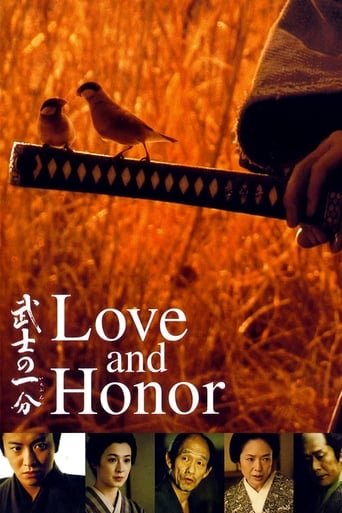

Viewed on DVD. Subtitles = eight (8) stars; sets/decoration = eight (8) stars; "score" = six (6) stars; costumes = four (4) stars. Director Youji Yamada's uninspired slice-of-life Shomin Geki (home drama) involving a castle-commuting samurai rendered blind from tasting poisoned food before it is served to the feudal lord (of, presumably, Osaka-Jo castle). The plot line of this tale offers a fascinating possibility which is toyed with, but discarded by the Director (to wit, the emergence of a skilled and renounced swordsman who uses sound rather than vision to vanquish his adversaries). Instead, Yamada provides a well-telegraphed (fully-expected), romantic happy ending (and a circular story). Acting is fine with overly melodramatic tendencies kept in check by Yamada. Costumes are bland, but sets and the decoration thereof are excellent. Film score is intermittent aside from the opening and closing credits; it consists essentially of one beautiful and haunting Leif Motif. Surround sound field is excellent, but sparsely utilized. Cinematography (semi-wide screen (1.85:1 aspect ratio), color), lighting, and editing are very good. Another Shochiku Studio middling programmer. WILLIAM FLANIGAN, PhD.
... View MoreOthers have commented on the story so I will skip the synopsis.The story is about human drama, and the unusual talent the main character has that leads to bombastic climax. This is typical Shuhei Fujisawa's style, and this story is no exception.What took away from the story compared to other Shuhei Fujisawa based movie is the poor acting by Takuya Kimura. His impatient and jittery personality shows in his acting, and the poor ways he speaks the dialog all takes away from the proper mood of the story. As the member of SMAP - a Japanese idol group, his acting DNA was bread for more modern situation, and probably isn't a good match for a period drama like this one. I couldn't get the feeling that this was a samurai living several hundred years ago. His poor dialog skill also was evident in more recent movie Uchuu Senkan Yamato as well. Another period piece starring his SMAP colleague Shingo Katori's "Zatoichi The Final" was also a flop, attesting to the mismatch of SMAP member with samurai movies.So the main focus was weak, but the movie still has quality all its own. The sword fight scene was superb like other Fujisawa novel based movies. As a samurai movie, this is still one of the best in recent years, and is recommended along with other Shuhei Fujisawa movies such as Hisshiken Torizashi, and Hana no Ato.
... View MoreYoji Yamada's appropriately dubbed 'Love and Honor' is a samurai's story of just that; Takuya Kimura is Mimura, a samurai who is used to test food for poisoning by eating it in order to prevent the lord of his clan from being poisoned. Mimura becomes blind after being fed an off-season food that can become poisonous if not prepared properly. Unable to provide for himself, Mimura becomes suicidal. His loving wife Kayo declares her support for him, offering to follow him into death. Mimura is convinced to continue on living, but with Mimura unable to provide for he and his family, his wife is left to find a way to support them. In this classic tale of love and honor, follow a blind man's struggles to find peace of mind as he tries to follow his samurai code.
... View MoreWhen YAMADA Yoji set out to make his "samurai trilogy", he was very clear in his mind what he wanted to do. "Twilight samurai" (2002) and "The hidden blade" (2004) both offer an image of samurais unlike what we are used to proud, cool, fierce. It's not that these qualities are not found in Yamada's samurais, but such qualities are overshadowed by the consciousness of a demeaning class system and a very human concern for daily livelihood, mundane but necessary. "Love and honour" carries on with the same theme, but with a slight variation in key, so to speak.The protagonist in L&H is a young samurai (played by pop and TV superstar KIMURA Yakuya, whose name I'll use here for convenience) of reasonably respected rank. Losing his father when he was quite young, he was fortunate enough to receive a good education. At the beginning of the story, therefore, he is not a victim of the predicaments of poverty or class prejudice we saw in the previous two of the trilogy. While not spectacular, life is stable and comfortable for Kimura and his beautiful wife, served by a loyal old servant that is not unlike "Alfred" ("Batman begins"), but of a comical kind.The "day in the office" for a samurai is dull when there is no war, as is the case during our story, and what excitement there is comes with a special duty for some of the samurais food testing for their feudal lord, as a security procedure against poison. The story really begins at the occurrence of a rare incident, when Kimura is blinded by poison that has accidentally found its way into the food he is testing.Here's when we are back to the convergence of the common theme. All of a sudden, Kimura feels like he is plunging into a dark abyss (both literally and figuratively), with thoughts that had never ever occurred to him before, such as whether he now has to make his livelihood as a beggar, all these despite the fact that he has a most loving and devoted wife. This becomes quite ironic when the wife, desperate for the mercy of the feudal lord in recognizing Kimura's service and keeping him on the payroll despite the fact that he is now blind, yields to the sexual advancement of the samurai superintend in exchange for the latter's promise to put in a good word for her husband. To cut a long story short, things come to a head with Kimura's discovery of his wife's well intended but ill advised action, culminating in a climactic duel with the villain.This is quite a simple story but the movie excels in its telling. There is the characteristic attention to details in Japanese, and furthermore in Yamads's movies. The reaction of this young (perhaps even a little spoilt) samurai to the devastating calamity is well depicted. But the otherwise gloomy narration is brightened, and lightened, at suitable point by humour (some of which sarcastic), provided chiefly by the faithful old servant and a nosy aunt who pops up from time to time. But the important thing is that the movie does not lose sight of the main theme. It is after learning the generosity of the feudal lord in granting status quo despite his disability that Kimura finds back his sense of humour. He is now able to laugh at himself for banging his head against a pole, quipping "I think he really wants to kill me", with reference to an earlier joke he made with the old servant.Nor are dialogue and facial expression the only elements of excellence in this movie. Check out the comical scene of the nosy aunt's hurried exit with her two kids after Kimura had indicated in no uncertain terms that she had out-stayed her welcome. The body movement of the characters in question is more eloquent than the most hilarious dialogue. Watch also, at the scene when Kimura seeks instruction from his teacher, how, with constantly shifting and balancing movements with his toes and the balls of his feet, he is ready to pounce in a split-second upon the imagined opponent when he senses (remember that he cannot see) an opening. Just two of the ample proofs that every scene in this movie has been afforded the utmost attention by director Yamada.
... View More